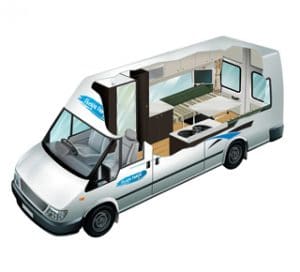Renting a vehicle in Australia is by far the best way to discover Australia if you don’t want to buy your own vehicle. When travelling in a motorhome, you will save money on hotel nights and you will have more freedom. However, costs for renting a motorhome in Australia vary. With the plethora of rental companies, it is sometimes difficult to choose. Find out everything you need to know about motorhome rentals in Australia at a glance.
Table of Contents
Motorhome rental prices
Motorhome rates vary depending on availability and season. Renting a motorhome can be quite expensive, especially if you are booking at the last minute. If you’re planning a trip to Australia or New Zealand, make sure you plan your budget in advance. If you book a motorhome three months in advance, it will probably be half the price of what you’d pay if you book a week before you leave! A substantial savings!
By the way, the longer you’re renting a motorhome the lower the daily rates. Newer and / or better equipped motorhomes are obviously more expensive. To give you an idea, a 4-seater motorhome can cost from $ 130 to $ 220 a day during the mid-season.
One of the best ways to rent a campervan at the best price is to use a comparison site. For Australia, we recommend the Motorhome Republic site. It will allow you to compare prices for different vehicles, then book online (without any additional fees). You can even filter based on your criteria: equipment, number of passengers, etc.
More information: Motorhome rental prices Australia
Cheap motorhome hire – Traveller tips
If you are looking for a good deal, here are a couple of tips. So here is what you should know about how to rent a cheap motorhome:
- Avoid picking up or dropping off your motorhome in a small town (they are more expensive). Prices from Broome, Alice Springs, Devonport or Dunedin in New Zealand are usually more expensive.
- Avoid “one way” rentals. Campervan companies often charge one way fees (around 150 AUD).
- Book well in advance. Prices go up depending on availability, so it’s always cheaper to book in advance.
- Check where depots of rental companies are located. If they are far away from the airport, you will probably end up spending money on a taxi.
- It’s worth renting a motorhome for a longer period of time, as daily rates usually decrease gradually. So for example, if you where planning on doing two trips in Australia, it might be cheaper to hire the same motorhome for the whole time.
5% discount on your Campervan rental
Hire a campervan and benefit from a 5% discount thanks to our promo code with Travellers Autobarn: GuideEN.
Where to hire motorhomes / campervans in Australia ?
Pick up locations in Australia
You most likely arrive in Australia in one of the major cities like Sydney, Melbourne, Perth or Brisbane. It is pretty convenient if you want to hire a motorhome in Australia. Due to the high competition among rental companies, you can get better deals in these big cities. Remote locations such as Alice Springs, Broome, Airlie Beach or Townsville are not the best option though.
If you’re planning a road trip in Australia, there are many routes and starting/ending points to choose from. Make sure your trip works with the available vehicle drop-off locations. Some tourist towns do not have car rental drop-off points because they are too remote. Also, keep in mind that rental companies may charge a fee for certain cities (such as Broome, for example).
Motorhome companies are usually located in proximity to the airport. On the one hand, this location might not be ideal for travellers who where expecting to pick up a vehicle in the city, on the other hand, it is quite convenient for international travellers. In any case, you still need to grab a taxi or shuttle to get to the depot. The spots located right at the airport are usually for “car rental companies” and rather expensive.
More information:
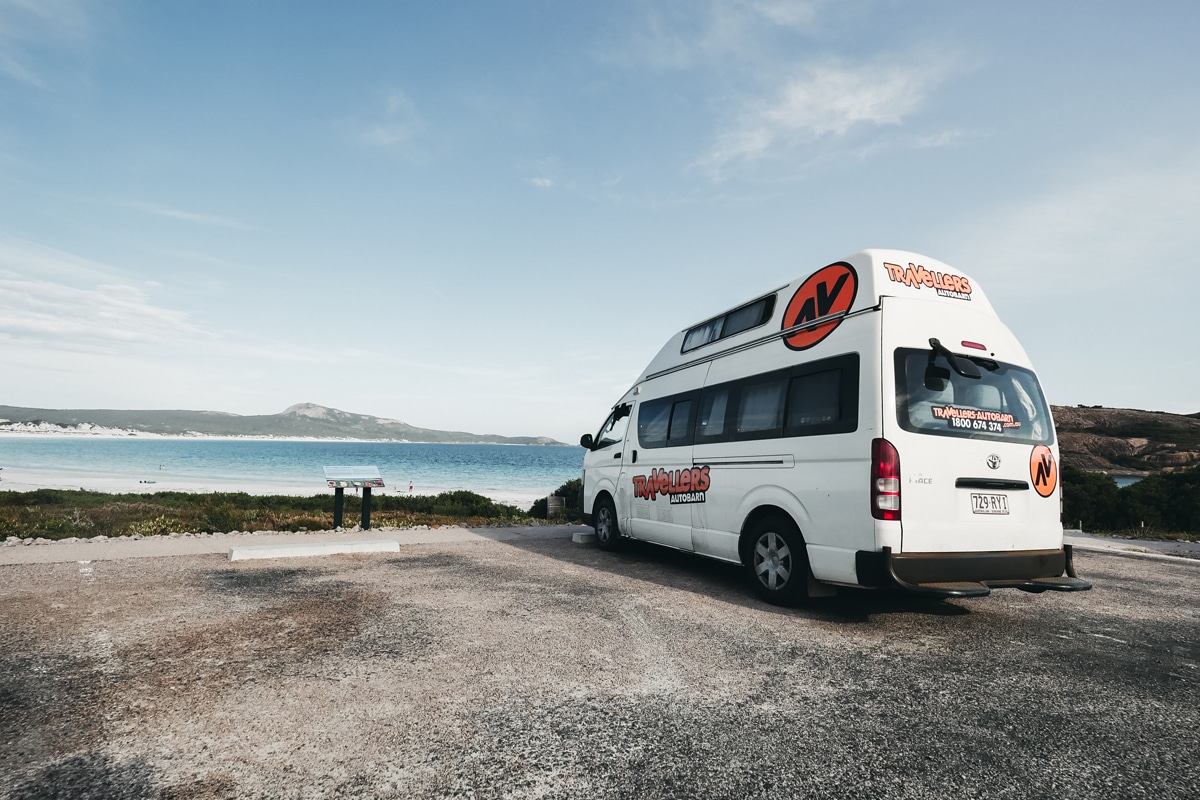
Main motorhome rental companies
There are probably over 50 motorhome and campervan agencies in Australia. The most popular ones are the biggest companies, offering various brands and models. Here is a quick overview of motorhome companies in Australia. Apollo and Britz are the biggest motorhome hire specialists. Both of them offer a wide range of vehicles with different brands. For example, Apollo has “Cheapa Campa” for their mid-range vehicles, and Hippie camper for budget campers.
High / medium budget Motorhome Brands
Most popular high-medium budget companies are: Apollo, Kea, Maui, Britz and Cruisin Tasmania.

Low budget campervan brands
Wicked Campers, Travellers Autobarn, Spaceships, Mighty, Jucy, camperman, Awesome Campers, Hippie Camper, Lucky Rentals

Find more details on Motorhome & Campervan hire companies in Australia
Motorhome hire in New Zealand
Hiring a motorhome in New Zealand is without a doubt the best way to discover this beautiful country!! It allows you to save money on accommodation and offers you freedom when it comes to seeing the lesser known areas of the islands. Most rental companies you know from Australia operate in New Zealand as well, mainly in Auckland and Christchurch.
More information: Motorhome & campervan hire in New Zealand
Choosing your starting city for your road trip
The city where you rent your campervan or van will determine your road trip in Australia. So make sure to plan your itinerary in advance, taking into account the seasons, points of interest, length of stay, etc. and what you don’t want to miss out in the country.
For example, if you rent your vehicle in Melbourne, you can choose to head west and do the Great Ocean Road and reach Adelaide. Or you can head north and reach the East Coast and Sydney. Depending on the season and length of stay, your itinerary will be different. Similarly, if you choose to rent a vehicle from Perth, your road trip will be on the West Coast and heading north.
We advise you to check out the road trip itineraries in Australia to get an idea of your travel options. This will also guide your choices on the must-see places you absolutely want to discover Down Under.
Motorhome models in Australia & New Zealand – what to choose ?
We use the term “motorhome” (American RV) for autonomous or “self-contained” (equipped with a shower / toilet cabin) vehicles. There are various models of motorhomes, from 2-seaters to 6-seaters. You will definitely find a model that suits your trip. If you’re travelling with children, remember to check the features of the vehicle to make sure it is suitable for your child’s age. Some vehicles don’t have anchor points, even if there are enough seats and beds that would fit your needs!
2 seater motorhomes
2-seater motorhomes (with toilet & shower) are usually made from the same manufacturer (Ford Transit, Mercedes Sprinter, Volkswagen Crafter). They all have pretty much the same layout, with a double bed at the back convertible into a sofa + table, and a kitchenette at the front with the shower cabin behind the driver’s seat.
Thanks to its size, the 2-seater is easy to drive and consumes little petrol.
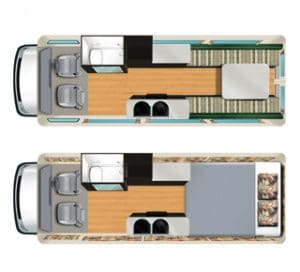
3 seater motorhomes
As this model is not much bigger than the 2-seater, it can only accommodate a couple with a young child. 3-seaters are not really common. So you won’t gain any living space. Be aware that 3-seater campervans are not very common and are usually in the “premium” ranges.
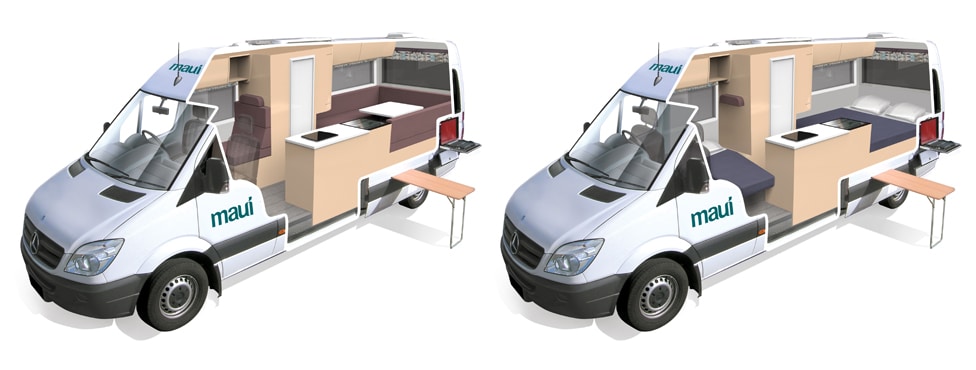
4 seater motorhomes
The 4-seater comes with two double beds and is ideal for a family with two children or two couples. However, it might be too small for a group of 4 friends. A large double bed is usually located at the front of the vehicle, convertible into a dining area. At the top, over the driver’s cabin, a second bed is set up. At the back of the vehicle, you have a kitchen area and shower/toilet cabin.
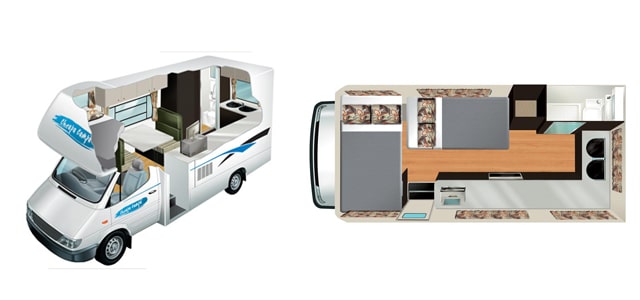
Most popular vehicles are from Volkswagen or Mercedes.
5 seater motorhomes
Those models are not really common. Although some companies such as Camperman offer 5 seater motorhomes, none of them have 3 beds. They only have 2 large beds and might not fit everyone.

6 seater motorhomes
This is the largest model available and can comfortably fit 4 adults. With 3 large double beds there is plenty of room for a family or a group of friends. It’s also a great option when traveling with 4 people, so you can leave one of the beds set up as a dining area. Otherwise, you need to undo the bed every morning.
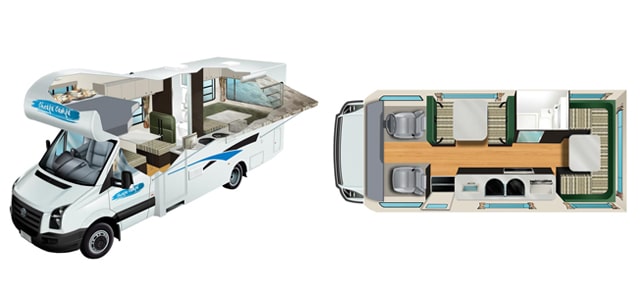
Motorhome and Campervan Equipment
If you have never rented a campervan, it can be difficult to know what to expect. But you will be surprised, these vehicles are very well designed! Of course, you shouldn’t expect five-star luxury, but you’ll find that even with limited space, you can still live comfortably on the roads! When renting a vehicle, including motorhomes, the rental company offers you different options to add to your standard rental. This can be a little overwhelming if it’s your first time renting. To make things easier, we provide you with a list of add-ons usually offered by rental agencies.
Equipments included
When you rent a campervan, some equipment is already included in the rental price.
The kitchenette is equipped with plates, bowls, glasses, cutlery, pots and pans, and tea towels. You have to buy detergents and sponges. Vehicles are usually equipped with a fridge or an electric cooler. Most of them also have a microwave, which you can only use when connected to main power.
Bigger motorhomes are usually equipped with a television and often a DVD player. This can be useful if you are traveling with children.
Other accessories such as broom, dustpan, shovel, clothes hangers, water pipe, sewage drain pipe and an electrical connection cable are included. On top of that, bed linens such as sheets, cushion covers and duvets as well as one towel per person are provided.
Options
Insurance
Rental companies offer different insurance packages. They always include a “standard” insurance in the rental price. It covers the bodily injury of third parties. However, any damage to your rental motorhome or to other vehicles is not covered. That’s why the rental agent asks you to leave a deposit (amount depends on the vehicle and the companies). To minimise any risks, it is recommended to take out a so-called “full comprehensive insurance”. Your deposit will be reduced to a minimum. It is also possible to take out private insurance or use your credit card insurance (speak to your your bank beforehand).
More information: Motorhome Insurance options in Australia & NZ
GPS / satellite phone
If you don’t have a mobile phone with internet connection or an international phone plan, a GPS might be helpful to guide to during your trip. Alternatively, you can download a map app to your phone, which allows you to view maps even if you’re offline. In general, renting a GPS costs around $ 10 per day depending on the rental company. You can also get a satellite phone if you are travelling to an isolated area without phone reception.
Camping table and chairs
You can choose to rent camping tables and chairs for the duration of your rental. These are especially convenient if you rent a small campervan that doesn’t have indoor seating. At resting areas or campsites, you find plenty of tables and benches for you use and you often have free access to. You pay about $ 15 for the chairs and $ 25 for the table. These prices differ from company to company.
Children car seats
If you are traveling with children and don’t have your own car seats, you can rent these of the rental company. Be aware that these seats are often quite old and not very comfortable. Companies usually offer this service if you take the complete package with insurance, table, chairs etc. The cost of the car seat varies by company. But expect about $ 50 per seat for the total rental period.
Extra drivers
If you want other people to drive the vehicle apart from yourself, you can add this option. The rental agent asks for the first and last name of every driver and their driver’s licenses. You will need to pay an extra charge of about $3 a day.
Toilet tablets
When renting a motorhome equipped with a toilet, you need to buy chemical tablets. This chemical will liquefy faeces and neutralize bad odors. Companies usually offer you to buy these tablets individually. Keep in mind that it is recommended to empty the chemical toilet every 3 to 4 days, so change the tablet with every oil change. The price per tablet is about $ 3.
Gas bottle
You get a full gas bottle when you pick up your campervan or motorhome. You can ask for a second bottle if you plan to use a lot of gas. It’s a good provision, especially if you are traveling with a family and you do a lot of cooking or if you take frequent hot showers. Rental companies usually offer better deals for gas than service stations.
Electric heater
If you are traveling during chilly months, you can rent a small electric heater. For it to work, it is necessary that the vehicle is connected to main power though. You won’t be able to use it if the vehicle runs on the battery. Rates are generally $ 15 for the duration of the rental.
Toll Package
If you plan to drive through big cities, be aware that most of them charge tolls. Ask the rental agent if this option is available for the cities you want to visit. This way you can avoid unpleasant surprises at the end.
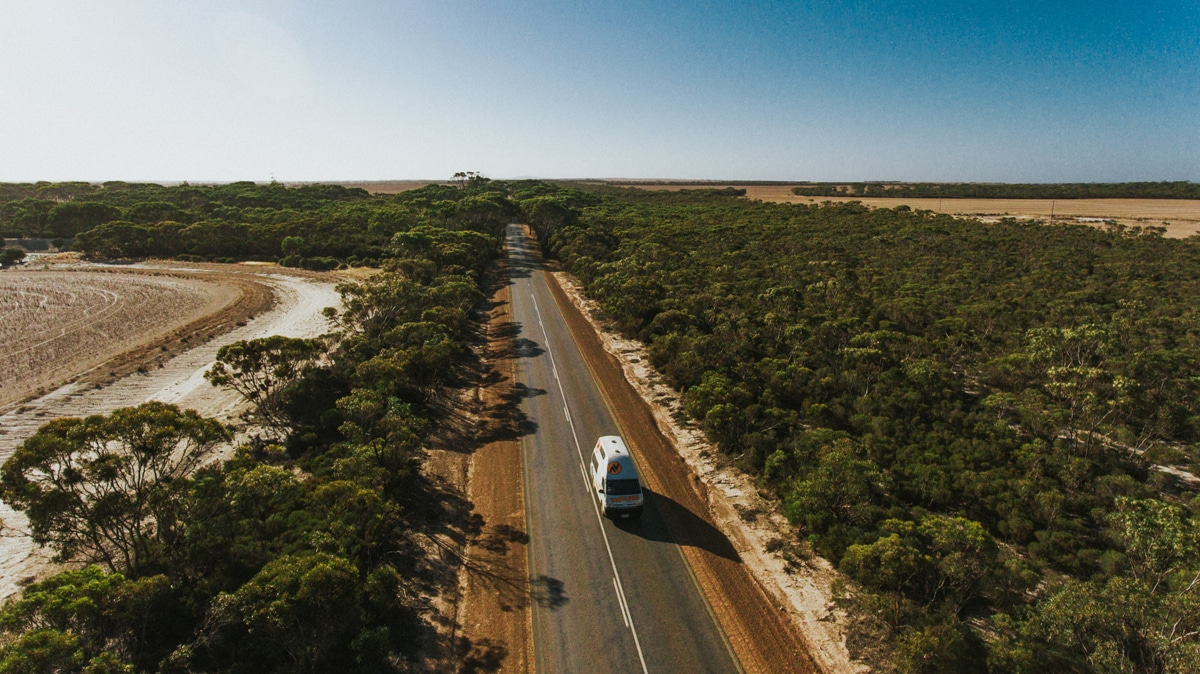
Traveling with a campervan / motorhome, how does it work?
When traveling for the first time in this type of vehicle, it is quite common to feel a little lost at first. Indeed, depending on the type of vehicle, you will need to learn how to use different equipment and develop good habits.
First of all, the driving of the vehicle itself, as a big campervan drives differently from a small car. However, it is not that complicated. You get used to it relatively quickly and they are also quite manageable. Just be sure to always check your mirrors and use the rear camera if present. Also don’t forget the high of the vehicle for bridges …
Then, the most important thing to understand is the battery system. So take some time during the vehicle inspection for someone to explain everything in detail. Don’t hesitate to take notes as it often involves a lot of information at once.
Another important point is the management of water, clean and used, as well as toilets. You will therefore have 2 water tanks (one clean, one used) and will need to regularly check them. Toilets also have a separate tank that you will need to empty in “dump points” (specific dumping areas that you will find in campsites, service stations or near information centres).
What to check for when renting / returning a motorhome
General check
When renting a campervan, it is very important to check the condition of the vehicle and its equipment. But when it’s a first time, one is quickly a little lost by all the features and tends to say “OK, well we’ll see all that later.” However, some malfunctions can make your trip less enjoyable and it is always difficult to make repairs during your trip or even prove that you are not responsible. So here are the important items to check before taking the vehicle:
- Carefully inspect your motorhome for damages before you sign the contract (interior, cockpit, engine etc.).
- Check your dashboard lights and rear view camera (very important for manoeuvring a large camper in tight spaces). Turn on the ignition and spend a few minutes making such everything is working.
- Have a close look at your rental contract including the fine print (look for hidden fees).
- Take photos, especially of existing scratches and small damages on the exterior and interior.
- Double-check that the vehicle corresponds to the model you booked. It can happen that the model you booked is no longer available. In this case, you get a different model. If this happens, you should be upgraded.
- Ask for user directions (electrics, shower, toilet, bed, charging systems etc.). Make sure you know how everything works.
- If you’re planning on driving in Sydney, Melbourne, or Brisbane, get maps and find out about the toll procedure.
Check the equipments of the vehicle
Benches and beds
In motorhomes, most benches convert into beds. Test them to see if everything works. If you find out the first night that your bed doesn’t fit properly, you won’t be very happy. If you have a bunk bed and are travelling with children, you should also check the safety net.
Doors
In motorhomes, there is a side door allowing you to access the inside of the vehicle without having to go through the cockpit. Remember to check that this door opens and especially that the bar to keep the door open is in good condition. People often break this bar by accident. Also test the small step that unfolds at the door. And don’t forget to close it before heading back!
Gas
Check the gas bottles. Normally you will be given one big or two small bottles of gas before your departure. If this is not the case, let the rental agent know immediately. Otherwise you will have to fill them up at your expense!
Shower and toilet
Look at the general state of the bathroom and check the joints around the toilet. If they are too battered and tight, you won’t be able to use the toilet. Also make sure that the water drain works well because the cabin is small and can quickly overflow.
Electrical equipment
You won’t be able to check these features when picking up the vehicle, because it will have to be plugged in. It’s best to test them on your first night though, when you’re not too far away from the rental agency if you need to go back.
- Fridge: There’s nothing worse than ending up with a refrigerator that doesn’t work. So make sure that during your first drive, the fridge starts to get cold.
- Lights: Turn on the lights inside the vehicle. Not everyone travels with a torch, and your phone’s battery will be like gold dust on your road trip!
- TV / DVD: Some motorhomes are equipped with a TV and a DVD player. So if these are important to you, test these devices as soon as possible.
- Microwave: A microwave is always handy for heating up and cooking food on a road trip. It only works when you are connected to main power.
- CD / USB / MP3 player: If you want to recharge your devices or listen to your favourite playlist, don’t forget to check this!
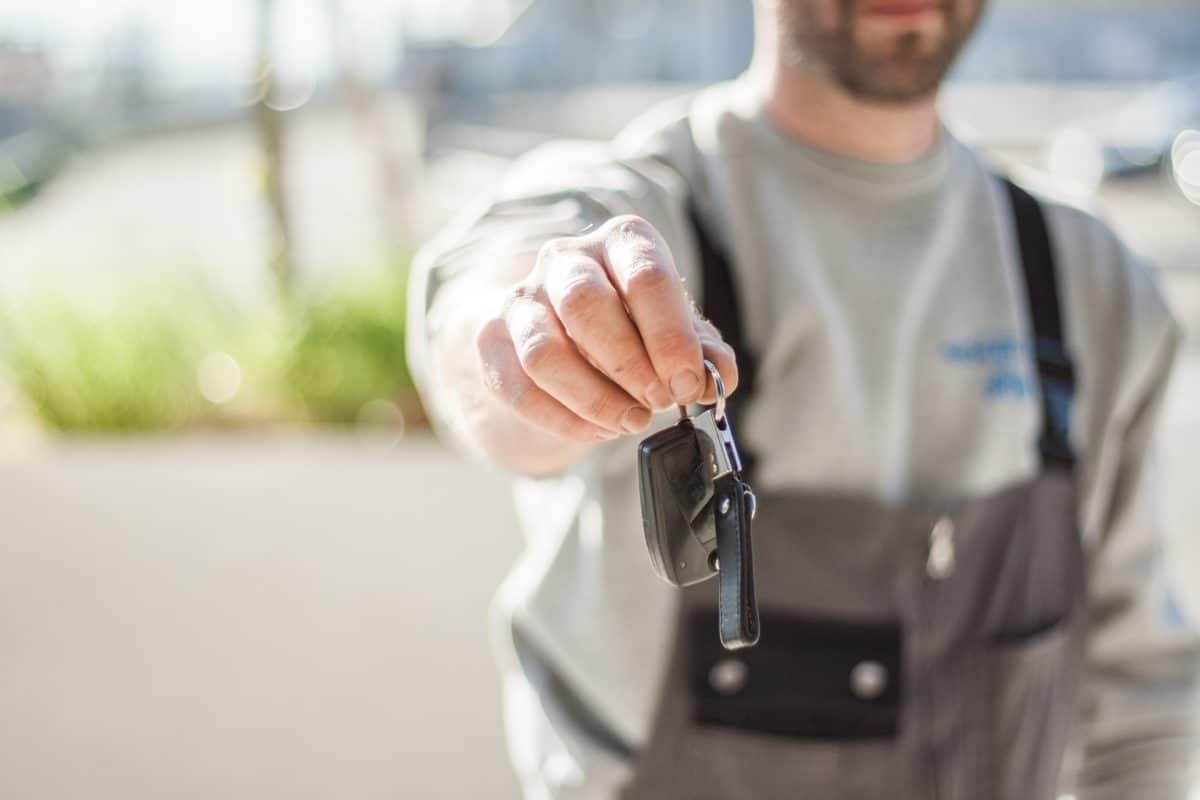
How to make a complaint about a rental vehicle?
Before leaving
If you haven’t yet left the rental agency and you spot a problem with your vehicle, you are obviously in the best position as you can show them on the spot what the issue is. But keep in mind that they don’t necessarily have to replace or repair it! Rental agents generally do their best to meet your expectations, but sometimes there are limitations. First of all, they often won’t have another vehicle available. Secondly, some things may take too long to repair. In some cases, they will suggest you wait for a few days (at their expense) until the repairs are done.
During your stay
If you notice a problem during your trip, you must inform the rental company immediately. Never take the initiative to fix things yourself or have your vehicle repaired somewhere without authorisation. Over the phone, a rental agent will be able to guide you to try to rectify the problem. If this is not possible, they will refer you to a mechanic or send you to a store. If the issue is with the vehicle’s equipment, they will usually ask you to drive to the nearest rental depot. So it’s up to you to decide if it’s really worth it.
When returning the vehicle
Obviously, you should avoid waiting until you are returning the vehicle to report a technical problem or defect. If you do this, it’s hard for the rental agent to know if the problem is your fault or not. Then again, it is quite common to notice wear and tear and dysfunctions that won’t be held against you. So don’t worry if you notice that a seal is leaking or a cupboard doesn’t close properly!
Compare motorhome prices
Driving in Australia : tips on the road
In Australia (and New Zealand), the roads are well maintained and you will not have any problem driving with a campervan! Don’t forget that Australia is the country of road trips! However, it is important to keep in mind a few tips that will be useful once on the road:
- The most important thing: in Australia you drive on the left side of the road!
- Speed limits are well indicated. The maximum speed on the highway is 110 km/h, 130 on some portions of the Stuart Highway that runs through the country from north to south. In the city, the speed limit is 50 km/h. Around schools and during school hours, the speed limit is 40 km/h, sometimes less.
- You cannot use your phone while driving.
- The blood alcohol limit allowed while driving must not exceed 0.05% (or 0.5 grams of alcohol per liter of blood)
- Highways do not have tolls and are free. The only exception is the major cities such as Sydney, Brisbane, and Melbourne.
Related topics:
Article updated on 03/06/2024




















